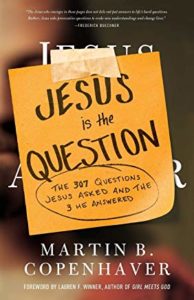 You could almost say that faith is a gift that keeps on giving. That is, no matter how many times I visit the issue of faith, there comes another time when the subject deserves another look. It’s a very big subject.
You could almost say that faith is a gift that keeps on giving. That is, no matter how many times I visit the issue of faith, there comes another time when the subject deserves another look. It’s a very big subject.
Last September, in one of the rare occasions when I gave the message for the Sunday morning service at my church, I chose as a title, “What We Do; What God Does.” The message was about faith and grace—specifically, how our faith activates grace. Somewhere along the way, I had come to understand the concept that our faith is the mechanism that joins God’s promises with the fulfillment of those promises.
In other words, the promises of God are available to every one of us; they are the grace of God. But if I don’t come to them in faith that they are for me, I will never see them materialize in my life.
Both sides are required for the miracles to occur.
 What prompts my latest reconsideration of this vast subject of faith is the book my Sunday study group has been reading: Jesus Is the Question: The 307 Questions Jesus Asked and the 3 He Answered, by Martin B. Copenhaver. A few weeks ago, the group took up Chapter 4: “Questions about Faith and Doubt.” In those pages was a quote by William Sloane Coffin: “Faith isn’t believing without proof—it’s trusting without reservation.” [Coffin was a former Yale University chaplain who was instrumental in creating the Peace Corps.]
What prompts my latest reconsideration of this vast subject of faith is the book my Sunday study group has been reading: Jesus Is the Question: The 307 Questions Jesus Asked and the 3 He Answered, by Martin B. Copenhaver. A few weeks ago, the group took up Chapter 4: “Questions about Faith and Doubt.” In those pages was a quote by William Sloane Coffin: “Faith isn’t believing without proof—it’s trusting without reservation.” [Coffin was a former Yale University chaplain who was instrumental in creating the Peace Corps.]
I’ve spent some time chewing on the distinction Coffin draws. It doesn’t run parallel with the common Hebrews 11:1 guidance, which tells us that faith is the substance of things hoped for, the evidence of things not seen. For one thing, the Hebrews verse is about faith as a noun; the Coffin quote is about faith as a verb. It’s hard to adequately compare nouns with verbs. Worse than apples and oranges.
You may think otherwise, if you take the time to live with the Coffin quote for a while, but it seems to me that if all we had was the first half (believing without proof), faith would have to be considered static, inactive, and even fairly lifeless. But that second half, now, (trusting without reservation), that’s faith that opens up unlimited worlds of life-giving grace.




 A blog entry here two and a half years ago (January 2016) discussed a phase I was in of reading Marilynn Robinson books. The phase is currently being revisited because my reading buddy, Linda, and I have taken up
A blog entry here two and a half years ago (January 2016) discussed a phase I was in of reading Marilynn Robinson books. The phase is currently being revisited because my reading buddy, Linda, and I have taken up 


